
|
Transcript
18/03/2002 8:00
On Their Honour
Producer: Wendy Page
Researcher: Kristine Taylor
Hello, I'm Caroline Jones. This is a saga with the ingredients of an international thriller. Kerry and Kay Danes returned to Australia last year after ten harrowing months in an Asian jail. Kerry Danes was on extended leave from the army when he took a job in Laos running a security company. But when gemstones went astray amidst a web of global intrigue, the authorities targeted the Daneses. Only a sustained, top-level push got them home again. Now they're battling to regain Kay's health and their reputations.

JONATHAN THWAITES, Australian Ambassador, Laos: Kerry Danes is obsessed by his honour, his reputation, the honour of Australia, the honour of his regiment. He's a member of the SAS, and that carries with it a code of pride and honour in which the most important aspect is that he be ready for anything. That means that he keeps himself at peak fitness in the most adverse circumstances, that he endures pain, that he is not allowed to show undue emotion, that he is constantly on the outlook for adjustments that might be needed to enable him to survive, and that he doesn't admit defeat on anything.
His attitude, during this ordeal was that he could take it, and if, if he couldn't, well, he bloody well would take it. But what was not fair, what was really gnawing away at him, was watching his wife undergo these ordeals too. Kay, on her hand, wouldn't hear of being separated from Kerry for fear of what might then be done to him.
KERRY DANES: I think that the treatment in the prison could best be described as desperate men trying to achieve their aim.
KAY DANES: At first, it was very daunting, the thought of going there, the thought of taking the children there, and not knowing anything about Laos. And I rang up my friend Norma, who I was very close with, and Norma's always positive, and she said to me that, you know, soldiers' wives go wherever they have to go, and sometimes we don't like it, but it's going to be what you make it. It'll be an adventure if you put your whole... mind and soul into it, and it'll be an adventure and you'll enjoy it.
NORMA JAMIESON, wife of former army chief, W.A: It just seemed to me an extraordinary place to go, an extraordinary thing to do. But on the other hand, that was sort of the Danes - they did extraordinary things.
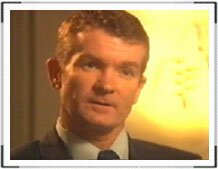
KERRY DANES: On my arrival in January 1999, there was only two clients and approximately 18 security guards working. Over that time, prior to us being arrested, we built the company up to 75 clients and employed in excess of 450 Laotians. And then we deployed them onto influential clients who were the Australian Embassy, ah, UNDP, ADB, World Bank. All the major foreign investors within Laos had our security on them.
Kay Danes worked with Lao Securicor Too. Later she also set up her own business in Thailand providing personal bodyguards for VIP's and foreigners.
NORMA JAMIESON: It didn't surprise me that she was running a security company. It was not unusual for Kay to tell me the most astounding things that she was planning to do. Everything that Kay Danes did was larger than life. That's how I found her and I think this is what attracted me to her. She dared to be different, but she didn't know she was being different. It was just Kay.
KERRY DANES: On the day of the arrests we were getting ready to go to Thailand for Christmas. Mr Bounmaly Vilavong, the foreign investment advisor for Laos, came to the office. At that time several cars arrived out the front, with approximately about 20 what we now know to be police officers. At this stage, we realised there was something untoward going on.
TED TZOVARAS, Lawyer: When she discovered that Kerry had been arrested, she immediately notified the embassy, took the children into the car, packed their things, and went across to Thailand for safety, where they were going in the first place.
7.30 Report 19 January 2001
Reporter: It's here at the Australian-funded 'Friendship Bridge', attempting to cross the border into Thailand with her children, that Kay Danes's personal relationship with the Lao authorities took a turn for the worst.
KAY DANES: Bounmaly Vilavong was coming at me with about 20 or 30 other policemen that were armed, and they completely surrounded the car. It was a totally terrifying experience. I've never been so afraid, and I've been in some pretty hairy situations.
TED TZOVARAS: They were searching for stolen sapphires. She didn't have any, of course. Instead, they found $US52,000 cash on her. She was running a security business in Thailand, and that cash was for the purpose of paying wages and other expenses in the business. It was that cash more than anything else that created an impression, a false impression in Australia, that they were guilty of some sort of wrongful doing.
What people must realise is that it is perfectly legal and it is quite common for businesspeople to travel across the border with large amounts of cash for the purposes of transacting their businesses. In the end, the cash at the border was a non-issue.
News footage
News Reader: Kerry and Kay Danes have been in police custody for the past seven weeks on suspicion of stealing jewellery and precious stones from the country's biggest sapphire mine.
JONATHAN THWAITES: No charges had been laid at this stage, no allegations had been spoken, so we didn't quite know what it was they were being accused of anyway, but one of the things we were most concerned to do was to get the kids out of the country quickly.
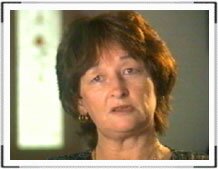
NOELA STEWART, Kay's mother: We were just dumbfounded, we were completely out of our depths, because it's a pretty sort of strange thing to happen, so we didn't know what to do. The children came back as unaccompanied minors. We went to the airport to pick them up. Ah, of course, Nathan felt like he was on a holiday to see his nan and pop. He was too young to really understand. Sahra - she knew everything that was going on, and she, she was very reluctant to leave her mother and father in Laos.
Foreign Correspondent, February 2001
Presenter: Australian couple Kerry and Kay Danes continue to tick off the days in detention in Laos, desperately uncertain about their future.
What's now becoming clear is that the mine where Kerry Danes ran security was the focus of a huge, international financial play which would dwarf the proceeds of any alleged threat, and that the hapless Danes just tripped into the wrong place, wrong time.
KERRY DANES: It did not enter our mind to flee the country, even after the repeated death threats. We are, or I am a person that, if I sign a contract with a client, then I will stand by him to the bitter end.
JONATHAN THWAITES: At the stage that Kerry Danes became involved, Gem Mining Lao was already in a great deal of trouble, and was already the subject of an inquiry by the Lao authorities and indeed, before very long, they had frozen the assets and the two remaining principals of the company left Laos.
What did happen afterwards was that some jewellery that was on the premises was later found not to be on the premises.
Bounmaly Vilavong: Gems, er, Mr Kerry Danes, he control all key.
JONATHAN THWAITES: Under their way of looking at things, he was the one responsible for removing them because he didn't protect them.
Bounmaly Vilavong After we can open that kind of box, empty inside, nothing.
TED TZOVARAS: Kerry Danes did not have the key or the combination of the safe any more than he would've had the key or combination of the Australian Embassy's safe, or any other of his clients. No security company takes any responsibility for the contents of any safe.
JONATHAN THWAITES: It very soon became apparent that transparency of process was something that was going to have to be pursued vigorously. It took a while to arrange the consular access visits. Normally, this will only be granted once every three months or so, but we eventually got into a situation where we were able to have weekly visits.
We were only allowed to see them separately. They were brought from the detention centre to the immigration bureau and we could see them in succession for 15 minutes each. We only saw them in a roomful of Lao officials so they had to be fairly guarded in what they told us. We just knew that the conditions were very hard. We knew that they were distressed when we saw them. We only found out about the way in which the interrogations were conducted by degrees.
KAY DANES: When I first arrived at the prison, I had no idea where Kerry was, and I had no idea that the reason why he wasn't signalling to me was because he was laying on the floor in his cell after copping a beating for four hours.
And they said that next time they would come in the night and they would torture Kerry in front of me, and if I didn't sign then they would kill me and kill him and torture me and kill me. And I said, "Well, you know..." because they asked me, "What do you say about that?" You know, "What? Are you not afraid to die?" And I said, "Of course I'm afraid to die, but how can I sign a lie?" You know, for all I knew, they were going to kill me anyway.
KERRY DANES: Under no circumstances would we sign a false confession. One thing that I had to come to terms with very quickly was that I knew that the reason Kay was there was to force me to break. That meant that I had to accept in my mind, which was quite difficult, that whatever they did to Kay, there was nothing I could do about it at that point in time.
KAY DANES: The interrogations - they're something that I find really difficult to talk about. I find it easier to talk about other people's problems, like another boy in the prison - he was tortured for four hours and he signed because he just couldn't take it anymore. But they were breaking his fingers one by one and they were rubbing chilli into his wounds. And they stripped him off and laid him on the ground and, and burned his foreskin with a Bic lighter. And the screams were just like nothing you've ever heard before, and I was so shocked.
NOELA STEWART: We never kept anything from the children, so if we got any new information, we'd all sit around the table and discuss it. Sahra was very upset one night because she said, "I KNEW I should have stayed there. If I had stayed there, I could've got my mum and dad out." Sahra decided that she'd write to the Prime Minister herself. He wrote her a nice letter telling her that he was doing everything in his power to resolve the situation, and that helped her a lot, because she felt like, I've been to the top. He knows about it. He will do something.
KERRY DANES: We realised that because of the efforts that were mounted in our support, that hopefully we wouldn't be there for that long. So we set about trying to put our own problems aside and try to fix up as many problems while we were in the prison to assist other people.
Prior to going to the meetings, we were threatened. We weren't allowed to say certain things, not mention the prison, what happens in the prison, etc. But we figured it was worth various treatments to get the information out so it could be dealt with by the appropriate authorities.
JONATHAN THWAITES: They took a lot more notice of what was happening to other prisoners than, in many cases, they did to what was happening to themselves. It was quite evident, as time went on, that the detention centre was becoming a better place partly through... in fact, largely through the efforts of Kay and Kerry.
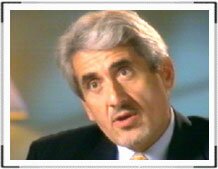
TED TZOVARAS: It was necessary - it was critical - for me to work behind the scenes. We had no idea what the allegations were. We had to build our defence on the basis of what we anticipated the charges might be. But it had nothing to do with the legalities, because the legal system in Laos is not developed. You do not fight it as a legal battle. It is a persuasion exercise and it is... and you have to persuade the government officials, not the judges.
JONATHAN THWAITES: While all of these legal manoeuvrings were going on, the embassy was employed day after day speaking to a whole range of Lao authorities, up to the most senior levels in the country. It's certainly not for me to make a pronouncement on this subject, but in the opinion of anybody that really knew what was going on, the Danes had no case to answer.
Six months after their arrest, and two weeks before the trial, Kerry and Kay Danes were finally charged.
TED TZOVARAS: The only words we had by way of charges, with no further particulars, were "embezzlement, tax evasion, destruction of evidence".
Ted Tzovaras had 'substantial evidence' to rebut all charges - including details from a person who claims to have removed the jewellery from the safe.
But no evidence for the defence was admitted.
TED TZOVARAS: The trial lasted five hours. A trial such as that in Australia would take at least four weeks. The judgment was delivered within 25 minutes after the court went to recess. It was already typed.
Under the Lao legal system no-one has ever been acquitted once charged.
Lateline, June last year
Reporter: A Lao court has tonight sentenced the Australian couple Kerry and Kay Danes to serve seven years jail, and fined them more than $130,000. The surprise sentence also includes an order to repay the Lao Government as compensation for missing gems and jewellery.
NOELA STEWART: That was a hell of a night. But I knew in my heart that Kay wouldn't be there for seven years. The government, by this time, knew they were totally innocent, and I knew if the government let them down they would have to take matters into their own hands, and they would come home. It's just something that you know. And I had total confidence that Kerry would get Kay home.
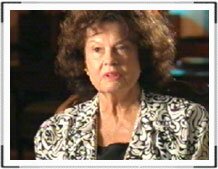
NORMA JAMIESON: I worried about her all the time, thinking about her and wondering what she was doing and wondering if she was even alive, wondering if she was being tortured. I didn't know what had happened to them, but I never for one moment thought that they ever were guilty - ever.
I wondered what I could do to help, and the only thing that I could think of was to try and get letters to her. My husband just so happened to be the Consul-General for Thailand here in Western Australia, and I thought that perhaps he might be able to send the letters to the Australian Ambassador. I didn't know whether or not she was getting my letters, but I just kept writing anyway, hoping that even if one got through she'd know that I was thinking of her.
KAY DANES: At times, I just felt like I was going to lose control at the immigration, that I was just going to refuse to come back, that they could shoot me, they could do whatever. I couldn't go back to that cell. I couldn't go back to see all those people suffering. I'd even wondered if there was diplomatic immunity in the Ambassador's car, which was parked next to our police vehicle, and thinking, all I have to do is get in that car and I'll be safe. But I never did that because Kerry always was in the car with the police and I couldn't leave him.
At a meeting in Hanoi, Foreign Minister Alexander Downer negotiated a settlement.
The Danes would withdraw their appeal and pay one million dollars compensation.
TED TZOVARAS: They felt that they had been sold out by the Australian Government. There is no way they could have withdrawn the appeal, because to withdraw the appeal would have meant that they accepted their guilt.
JONATHAN THWAITES: They want SPECIFIC compensation. They want something that ties it to a, to some sort of acknowledgement that, that the Danes are somehow responsible, and in fact, you and I know that they're not.
TED TZOVARAS: He committed them to pay just over a million dollars Australian, knowing full well that the Danes had no means of paying anything near that order. I had a formidable alliance with Jonathan Thwaites. It was the pair of us that were running this case.
JONATHAN THWAITES: It's very difficult for the Lao authorities to accept that there's anything much wrong with a situation where people may take the rap for something that they didn't do. As they said to us on a number of occasions, if the Danes had been released, where does that leave us? How can we get the compensation for all the damage that has been done to the Lao people over the years by Gem Mining Lao? Don't be too fussed about the connection between the Danes and Gem Mining Lao. The Danes are all we've got left.
As it transpired, the appeal was dismissed. In 'desperation' Kerry and Kay Danes then accepted the compensation bill.
They signed a document acknowledging their conviction, but importantly to them, not guilt.
The seized cash was accepted as a down payment and they were released on an undertaking to pay the rest by instalments.
JONATHAN THWAITES: They were released on the condition that they were released into my custody, and that they didn't attempt to leave the country before all the ends had been tied up.
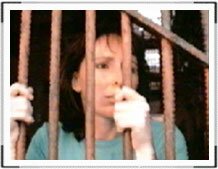
KAY DANES: I had tears just streaming all over my face and I just didn't want to leave - in some way I didn't want to leave. But I had to. I really wanted to go home to the children and to my family, but I also had a family in the prison.
KERRY DANES: And it was sad to leave them in what appeared to be an unfortunate position without little hope for them. We had given them hope throughout our detention, and then I felt like we were betraying them by leaving them because now they had no hope.
JONATHAN THWAITES: They were living in this residence - the Australian official residence - and they were, in fact, as time went on, here for 31 days. That was a very intense period too.
I don't think Kay would mind my saying that she was quite traumatised by the experience, and I think it will probably take her a long time to recover and get over the trauma of ten and a half months incarceration.
I grew very fond of the Danes. I admire their compassion, I admire their humanity and I admire their discipline. Yes - I have to say that I finished up regarding them as real friends.
NOELA STEWART: When Kay first arrived back from Laos I was totally shocked at the sight of her because she had lost so much weight, but Kay was extremely high and I knew it was the medication that she was on. She was on medication for all the time she was at the Ambassador's residence, and she's still on medication today.
KAY DANES: The only truly happy moment I've had, like, where I've felt total happiness was when I went to Dreamworld with the kids and went on the roller coaster, and it was like a release that I felt like screaming, so I did.
I thought that when I was released that things would get better and better and that life would be really good and something to look forward to, but it's not like that.
Listening to someone getting interrogated - I can hear day, night. I can recall it. I can hear it as plain as day. It's something... it sends a chill so deep right through you that you want to run from it, but you can't.
After Christmas we went to Blackwater in Queensland to see Kerry's dad, and I was in a terrible situation where I was lying on the bed holding myself because I could feel all my skin just crawling and I just wanted to die. I wanted to go in the bathroom and get his father's razor blades and just kill myself. And if I hadn't have had Kerry with me, then maybe I would've gone and done that.
NORMA JAMIESON: These people, I am totally convinced, have done an amazing job in surviving at all. I had this awful feeling of guilt. Why didn't I write more? I should have done more, I should have done more. Why didn't I do more? But then I had to say, well, of course, I didn't know whether she'd got even one letter.
KAY DANES: I have to keep looking to people like my friend Norma Jamieson, people that are really strong that inspired me in the first place.
One day I'm good, the next day I'm sad. One day I'm up, I'm down. I'm all over the place, constantly flipping. I've got medical problems, I've got emotional problems. I've also got practical problems. Even though the conviction is in Laos it affects me in my own country. Who's going to employ me? I've got a criminal conviction. Who's going to employ me in the security industry, where honesty and integrity is the very thing that gets you employed?
KERRY DANES: So we need to make sure that our names are clear and that people do have a full understanding that we were innocent, and that people were responsible for criminal activity against us.
I believe that at this stage I don't have any side effects from the experience, but what it has done is prepared me for the next test that comes along.
JONATHAN THWAITES: If Kerry with all his SAS training, with all his discipline and dedication, patriotism, is ever going to break, it's not going to be for physical reasons. It's going to be because he doesn't feel he can restore his good name, and that he has somehow been judged by his own people to be guilty of something that he absolutely didn't do.
Alexander Downer says the Lao Government was given no guarantee that the Daneses would pay the compensation. Nor would the Australian Government enforce payment.
Kerry Danes is now back at work in the army.
|